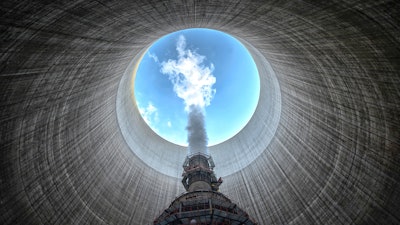
BOISE, Idaho (AP) — A California company wants to build and operate a compact fast nuclear reactor in Idaho.
The U.S. Nuclear Regulatory Commission said Tuesday that it has accepted a license application submitted by Oklo Inc., to build a 1.5-megawatt reactor at the U.S. Department of Energy’s nuclear site in eastern Idaho that includes the Idaho National Laboratory.
However, the commission in a June 5 letter to the company said it would need more information on key safety and design aspects on the “first-of-a-kind submission” before beginning an overall review of the project. The timeline for that process is not clear.
The Energy Department in recent years has been eyeing fast reactor designs that backers say have the potential to use spent nuclear fuel produced by conventional nuclear power plants.
The U.S. has no permanent repository for about 77,000 tons (70,000 metric tons) of radioactive spent fuel, stored mainly at the commercial nuclear power plants where they were used to produce electricity.
The U.S. has also been looking at reducing greenhouse gas emissions by producing more nuclear energy, a program started during the Obama administration that continues under the Trump administration.
Fast reactors and conventional reactors each produce energy through nuclear fission. Conventional reactors slow the process while fast reactors don't, which presents some advantages but also technical and safety challenges.
There are currently 95 conventional nuclear power plants in the U.S. that produce about 20% of the nation’s energy, according to the Nuclear Regulatory Commission.
The Energy Department had a fast reactor, the Experimental Breeder Reactor-II, operating in eastern Idaho until it was shut down in 1994 as the nation turned away from nuclear power following nuclear disasters. Pennsylvania’s Three Mile Island underwent a partial meltdown in 1979, and a reactor at the Chernobyl nuclear power plant in Ukraine exploded and burned in 1986.
The Energy Department through a competitive process in February selected Oklo as the company to receive spent fuel from the now-decommissioned Experimental Breeder Reactor-II at the site. The spent fuel would be reprocessed and used in the company's fast reactor, called Aurora.
“This award paves the way for an important demonstration of the first Oklo Aurora plant, as well as the ability of advanced reactors to convert used nuclear fuel, that would otherwise be treated for disposal, into clean energy,” Jacob DeWitte, Oklo co-founder and chief executive officer, said in a statement at the time of the award.
Okla’s ultimate goal, if the reactor is built and proves to be successful, is to produce compact fast reactors and put them in areas where energy sources are a problem. The company says the power plants could run for years without refueling.
Edwin Lyman, director of Nuclear Power Safety at the Union of Concerned Scientists, a nonprofit, said political pressure is driving much of the push for fast reactors, and he's concerned that could lead to a weakening of the Nuclear Regulatory Commission's safety and security oversight.
“The fact is these are reactors that have never been built or demonstrated,” he said. “There are some serious safety issues that still need to be resolved.”
He also said the capacity for such reactors to help dispose of the nation's spent nuclear fuel is being greatly overstated by supporters of the technology.
On a related front, the Energy Department last year announced plans to begin a process to build a test reactor in eastern Idaho that would help in the creation of a new generation of fast reactors. Multiple companies are pursuing fast reactor designs that could be aided by such a test reactor.






















